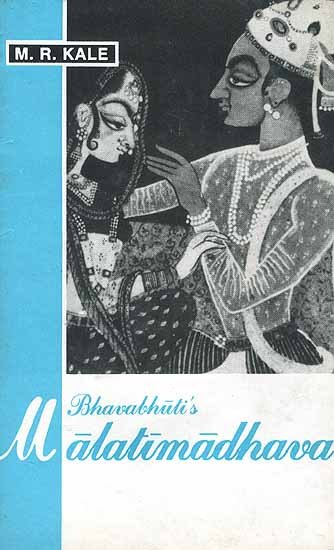Malatimadhava (study)
by Jintu Moni Dutta | 2017 | 52,468 words | ISBN-10: 8120813057 | ISBN-13: 9788120813052
This page relates ‘Pada-dosha (defects of word)’ from the English study on the Malatimadhava of Bhavabhuti:—A Prakarana type of Drama in ten acts revolving around the love-story of Malati (from Padmāvatī) and Madhava (from Vidarbha). This study discusses the history of its author and the literary, social, religious, historical and cultural aspects of the Malatimadhava.
Part 5.3a - Pada-doṣa (defects of word)
Mammaṭabhaṭṭa says that pada-doṣa (Defects of word) are of sixteen types. The defective word is such as—
- śrutikaṭu (unpleasant to ear),
- cyutasaṃskṛtya (lacking of correctness),
- prayukta (unconventional),
- asamartha (incapable of giving sense),
- nihatārtha (having its meaning supressed),
- anucitārtha (having an improper signification),
- nirarthaka (useless),
- avācaka (not expressive),
- tridhāślīla (indecorous in three ways),
- sandigdha (ambiguous),
- apratīta (unintelligible),
- grāmyam (vulgar),
- neyārtha (one whose meaning has to be guessed),
- kliṣṭa (it is obscure),
- avimṛṣṭa avidheyāṃśa (having predicate factor not discriminated),
- viruddhamatikṛtsamāsagatameva (of repugnant implication only when occurring in a compound).[1]
In the Mālatīmādhava five defects occurring in words come to view.
These are—
- śrutikaṭutva (The unpleasantness to the ear),
- nirarthakatva (uselessness),
- cyutasaṃskṛti (lacking of correctness),
- grāmyatva (vulgarity),
- aślila (obscenity).
(i) śrutikaṭutva (The unpleasantness to the ear)
The word śrutikaṭutva denotes consisting of harsh letters.[2] In the Mālatīmādhva some words consisting of harsh letters are found in the verse vyāghrāghrātamṛgīkṛpā ………………etc.[3] Herein, the letter r in vyāghrāghrāta and randhra, the letter ṅ in khaṅgāhati are harsh and hence the verse becomes unpleasant to the ear while read.The another examples is found in the act V.16.
(ii) cyutasaṃskṛti (Lacking of correctness)
The doṣa called cyutasaṃskṛti arises from the violation of grammatical rules.[4] In the Mālatīmādhava cyutasaṃskṛti occurs in the verse skhalayati vacanam etc.[5] Here the word subhru is found grammatically incorrect form. Hence it becomes a case of blemish called cyutasaṃskṛti.
(iii) nirarthaka (Uselessness):
The doṣa called nirarthakatva is found when a word is used only to complete the metre of a poem and has no impact on the meaning. [6] In the Mālatīmādhava some verses are found with hi having no sense and use. For example in the verse vyatiṣajati padārthānāntaraḥ……………..etc[7] wherein the letter hi does not express any sense as it has been used by Bhavabhūti in order to complete the metre.
Other examples are–
- Act I- 34
- Act II - 7
- Act VI - 17
- Act VIII - 12
(iv) aślīla (Indecorous):
The doṣa called aślīlatva or indecorous is of three kinds, implying either,
As for instance in the Mālatīmādhava this fault arises in the verse utkṛtyaotkṛtya kṛttiṃ …………etc[8] wherein Bhavabhūti has used many words viz., utkṛtyotkṛtya, pṛthūcophabhūyāṃsi, ugrapūtīni which have duly suggested the existence of disgust the 2nd variety of the aślīla i.e. Indecorous.
(v) grāmyatva (Vulgarity):
The grāmyatva is a word that is used only by the lower order of men.[9] In the Mālatīmādhava, this defect arises in the verse tvatvatsalaḥ kva sa tapasvijanasya…… ………..etc[10] wherein the term kanyāvitaḥ is used by a caṇḍāla kapālakuṇḍalā.Where the term kanyāviṭaḥ is vulgar. Hence it is regarded as the defect called grāmyatva.
Footnotes and references:
[1]:
Kāvyaprakāśa,VII.50-51
[2]:
śrutikaṭu paruṣavarṇarupaṃ duṣṭam /
Ibid.
[3]:
vyāghrāghrātamṛgīkṛpākulamṛganyāyena hiṃsāruseḥ /
pāpa prāṇyupahāraketanajuṣaḥ prāptoasi me gosaram //
so’ahaṃ prāgbhavataiva bhūtajananīmṛidhnomi khaṅgāhoti /
chinnaskandhakavandha randrarudhiraprāgbhārāniḥsyamdinā //
Mālatīmādhava,V.29
[4]:
cyutasaṃskṛti vyākaraṇalakṣaṇahīnam /
Kāvyaprakāśa,VII.p.166
[5]:
[6]:
nirarthakaṃ pādapūraṇamātraprayojanaṃ cādipadam /
Kāvyaprakāśa,VII.170
[7]:
vyatiṣajati padārthānāntaraḥ ko’pi hetu /
na khalu vahirupādhīnprītayaḥ saṃśrayante //
vikasati hi pataṅgasyodaye puṇḍarīkaṃ /
dravati ca himaraśmāvudgate candrakāntaḥ //
Mālatīmādhava, I.24
[8]:
utkṛtyaotkṛtya kṛttim pṛathamamatha pṛthūchophabhūyāṃsi māṃsā /
nyaṃsasphikprṛṣṭthapiṇḍādyavayavasulabhānyugrapūrtīni jagdhvā //
āttasnāyvantranetraḥ prakaṭitadaśanaḥ pretaraṅkaḥkaraṅkā /
daṅkasthādasthisaṃsthaṃ sthapuṭagatamapi kravyamavyagramatti //
Ibid.,V.16
